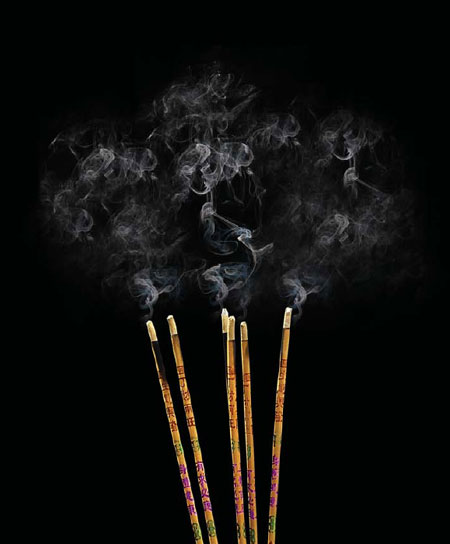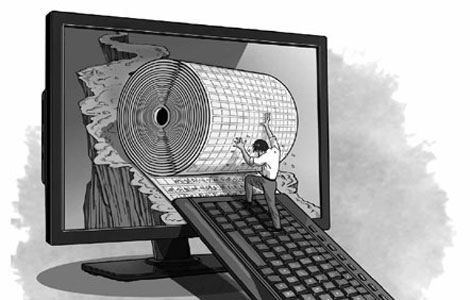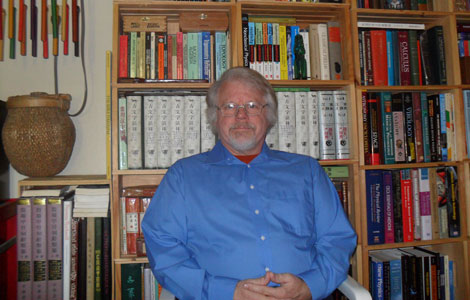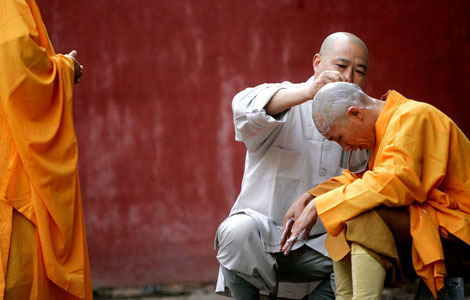Officials: A matter of faith
Updated: 2013-10-10 15:08
By Ji Zhebu (China Daily)
|
||||||||
There's growing disquiet that some CPC members are embracing religion and superstition, as Ji Zhebu reports from Beijing
A growing trend of belief in superstition and religion among some members of the Communist Party of China is a dangerous phenomenon and a "betrayal of the public interest", Chinese political experts have warned. The media has exposed several officials - some of whom have been found guilty of massive corruption - who frequently visited fortune-tellers or based their decisions on horoscopes.
The former railways minister Liu Zhijun, who was given a suspended death sentence in July for accepting bribes and abusing his power, admitted to holding a deep belief in feng shui, the practice of promoting harmony between humans and the natural environment. Although his position as a member of the CPC required him to be an atheist, he regularly invited feng shui masters to help him choose auspicious dates to commence and complete major projects.
Song Chenguang was a senior political advisor in Jiangxi province. Song, who received the death penalty with a two-year reprieve in 2012 after being found guilty of accepting bribes, is also reported to have visited a fortune-teller for advice on political decisions. In a study that focused on 103 convicted senior officials, Professor Tian Guoliang of the Communist Party of China Central Party School discovered that some corrupt officials turned to superstitious practices in the hope they would help to prevent their crimes from being discovered.

"These examples reflect an absence of belief (in Communism) in some members of our Party," said Wei Qingyuan, a professor at the China Executive Leadership Academy. "This kind of behavior betrays the public interest and trust, and should cause alarm bells to ring."
One such example is Han Guizhi, former head of the top advisory body of Heilongjiang province, who was given a suspended death penalty in 2005 for accepting bribes.
Han had a room specially designed to hold three statues of Buddha and paid frequent visits to the Jile Temple in Harbin, the provincial capital. According to media reports, during her detention in Beijing, Han often faced the wall and asked, "Buddha, why don't you bless me?"
And it's not just officials. Belief in superstition and religion is also increasing and spreading among rank-and-file Party members.
Sun Xuemei, a senior landscape designer at a real estate company in Beijing, said some of her friends and ex-classmates who are Party members have become devout Christians or Buddhists in recent years.
"They are generally important professionals in their workplace, usually State-owned enterprises, private businesses or government departments. Most of us joined the Party at university," she explained.
"When we gathered and spoke together, I realized that they weren't joking about their belief in religion, but were really serious about their new faith. They even try to persuade me to join them whenever we meet," she said.
A dangerous signal
The public often takes stories about Party members' belief in religion or superstitions as a form of entertainment, but experts have warned that the phenomenon has sent out a dangerous signal.
"The root of the problem lies in the unfair and less-than-transparent system for selecting talent, the relationship-oriented social atmosphere, and China's ineffective supervision and punishment mechanism on corruption," said Xiao Tangbiao, a professor at the School of Government at Nanjing University.
Drastic remedies are called for. Without them, even the measures that require Party members to confirm their belief in Communism will not be enough to stop people secretly turning to other belief systems, he warned.
Cheng Ping, a professor at the Department of Social and Cultural Studies at the Chinese Academy of Governance, echoed that view and said superstition is a deep-rooted problem among government officials. Nowadays, some Party members don't seem to believe that anything is worth defending with their own lives and are motivated by nothing more than personal interest, according to Cheng.
"It's extremely difficult to rebuild faith and ideals, which can take hundreds of years to establish but only minutes to overthrow," she said.
Cheng's statement is not intended to shock or attract attention, but is based on a 2006 survey conducted under her leadership by the Chinese Academy of Governance.
The survey showed that roughly 28.3 percent of government officials at county or departmental level believed in telling fortunes by reading a person's face. Meanwhile, 18.5 percent believed in traditional Chinese dream interpretation, 13.7 percent believed in horoscopes, and 6 percent believed in drawing "fortune sticks" at temples.
The survey's findings were based on 900 replies from officials in 17 cities, provinces and autonomous regions. Around 87 percent of the respondents were aged between 35 and 54.
A different survey into the political attitudes of local officials, conducted between 2003 and 2004 by Xiao, indicated a serious level of discontent among those polled.
The 571 interviewees were all local officials and 97.2 percent of them were Party members. They worked at county- and city-level government departments in a number of provinces.
To the question: "How do you view the present official selection and appointment system?" more than 52 percent chose "Basically alright", while 45 percent opted for "Not fair and transparent". The others declined to answer.
"The survey only involved a small number of people and therefore is not fully representative, but in some senses it tells us that some of the officials were repulsed by what they saw happening in official circles," commented Xiao.
Professor Cheng said that although promotion is partly influenced by individual effort, that doesn't necessarily mean that people will attain the positions they covet simply through hard work.
"Some of the factors influencing the selection and promotion of officials are too unpalatable to be put on the table. Therefore, the officials have to look for spiritual sustenance from religion because they cannot control their own futures," said Cheng.
Greater tolerance
According to Cheng, since China launched the reform and opening-up policy in 1978, a number of religious, philosophical and political theories from overseas have become well known and society has become more tolerant of different ideas. These theories can have a great influence on government officials.
"These foreign ideas broadened the minds of the Chinese people and provided them with a more objective and comprehensive understanding of the world. However, these theories also have become a challenge to Marxism-Leninism - the guiding ideology of the CPC - and have result in fuzzy thinking and confusion among Party members," she said.
According to Wei, the development of the market economy and the rising standard of living have given local officials huge amounts of power, which they often abuse for financial gain. Some weak-willed people or those with a poor understanding of communist ideals will be easily tempted to act in their own self-interest when offered bribes, either financial or sexual.
"We have undertaken research into corrupt officials and found that most of them struggled with their consciences when accepting bribes or embezzling money. Many corrupt officials hope that by repenting their past mistakes, God or Buddha will afford them protection and forgive their errors," he explained. "Corruption is not a problem of faith, but for some departmental leaders and high-level officials, power and restraint are in a serious imbalance."
Zhen Xiaoying, former vice-president of the Central Institute of Socialism said faith is a spiritual activity, which is hard to measure or calculate. Moreover, additional factors also need to be taken into consideration.
"Honestly speaking, some members have joined the Party with a very ambitious utilitarian purpose. They hope identification with the Party can pave the way for promotion and make them more competitive among their peers," said Zhen.
In the past, Party branches maintained close links with their members, but nowadays, the connection between some grassroots branches and Party members exists in name only, she added.
Zhen said that without proper attention from the Party branches, the members are unable to discover a sense of belonging. By contrast, religious believers have a comparatively closer connection with each other and their organizations.
Restoring the balance
In his survey, Xiao also asked, "Do you believe Communism will be fully implemented eventually?" Almost 43 percent of respondents chose "Definitely", while 24 percent opted for "Possibly". More than 24 percent selected "Hard to tell" and 3.2 percent chose "It is impossible". The rest opted for "I don't know".
"The answers actually shocked me a little at the time because they revealed that some Party members have a vague understanding of, and faith in, Communism. We have to admit that Buddhists and Christians have formed specific images and people can see what they are praying and talking to. But Communism is an ideology that is hard to touch and see," said Xiao.
Xiao called for specific goals to be established as a means of detailing and universalizing communist ideology in both the material and democratic aspects, which would help Party members to clarify their roles, he said.
He said China has made slow progress in recent decades in researching the political faith of officials through the evaluation of their attitudes to politics, morality and values.
"Insufficient evaluation of these topics has directly contributed to the failure of our anti-corruption and corruption-prevention mechanisms," he said.
In addition, he called for the strict management and supervision of officials, especially those in high-level positions that wield great power. He urged greater public transparency regarding the private assets held by officials and said public and media scrutiny should be encouraged.
"Religious doctrines tell believers to perform good acts, to forgive and offer assistance to other people, things that are not irreconcilable with Communism," said Wei.
However, he stressed that doesn't mean that Party members' belief in Communism should change. On the contrary, that belief should be maintained in the light of the limitations and negative aspects of religion. Decision makers responsible for promoting the best interests of the public should not make decisions based on God, Buddha or superstition, but should use scientific methods to actively seek solutions when faced with tough problems.

(China Daily USA 10/10/2013 page7)
Most Viewed
Editor's Picks

|

|

|

|

|

|
Today's Top News
Kerry says US will work to end fiscal crisis
Trending news across China
Americans to name panda cubs at Atlanta zoo
US investors say they are less bullish on China
Obama remarks show China high on agenda
Hong Kong benefits from rising renminbi
WB chief praises China for reforms
China is a major contributor to global growth
US Weekly

|

|















